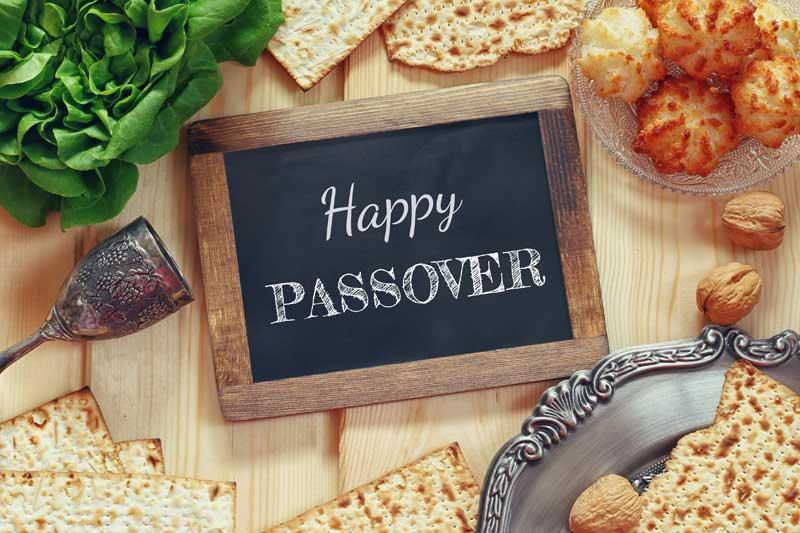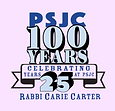From the Rabbi: Pesach 5780 - How different are these nights!
- Piper Panzeri

- Mar 30, 2020
- 7 min read

Dear PSJC,
Passover is almost upon us. The first seder begins this year Wednesday night, April 8th. Because of the unprecedented nature of Passover this year, here are some suggestions about how to make Passover meaningful and safe this year—some will be quite familiar, others, will be unique to this year. But hopefully altogether, they will help to make this Passover a good and meaningful celebration for you and all you love. The Conservative Movement has developed a number of important guidelines to help us all navigate the challenges of Passover 5780, in light of the restrictions placed upon us due to COVID-19.
1. Here is the Rabbinical Assembly’s yearly Passover guide It is a good overall guide for Passover in ideal times. Below are adjustmets that are acceptable within the framework of Jewish Law for this year of celebrating Pesach in the shadow of COVID-19.
2. Seder: Personal Sedarim and Streaming Seder
This year, it is not safe to gather in large communal seders or even with large gatherings of family and friends. This is clearly quite emotionally challenging for us all, and we will miss gathering all around a large physical table on Seder night, instead creating private small Sedarim of immediate family and individual sedarim this year. But that is what we must do in order to ensure that we and those we love, will be able to celebrate together in the future.
While even one individual can have a Seder, this year, unlike most years, I want to encourage you to allow your seder to be a “virtual seder” (through the use of Zoom or other methods) so that you are not alone on this night. You can turn on Zoom before the holiday starts and just keep it on throughout the night. This would allow us to be together, even across distance. It would, no doubt be a huge help to those unable to conduct their own seder, and will help us connect at a time when that is most needed.
3. Sharing your Seder with others
If you would like to open your seder up to others via Zoom, please drop me a note: rabbicarie@psjc.org with the following information:
Date/Time of the Seder
One Sentence description of the Seder—(abbreviated, child-friendly, extensive deep discussion, etc)
Haggadah that you are using
4 Check out the PSJC Website www.VirtualPSJC.org next week to see good resources for creating meaningful Sedarim. 5. A few tips to keep in mind when purchasing food for the seder: Matzah - One is obligated to avoid hametz throughout Passover, but the obligation to eat matzah is limited to fulfilling the rituals of the first/second night seder alone. We do not need to eat matzah throughout the week. So don’t worry if you can’t obtain as much Matza as you usually do. All you need is about one piece of matza per person per seder. Karpas – Parsely or celery are regular favorites for Karpas. But remember, this can be any vegetable—including a boiled potato. Maror - If horseradish is not available, you should search for other fruits or vegetables that can bring a tear to the eye if consumed raw: hot peppers, mustard greens, raw lemon are good options. Don’t forget Romaine lettuce with its bitter aftertaste which can also work as maror. Roasted Shankbone on Seder Plate -- A roasted beet works in place of the shankbone (Pesahim 114b) 6. Kashering/Cleaning: Check out the Rabbinical Assembly’s Pesach Guide for details on cleaning and kashering things for Passover. Remember, this year above all, that things do not need to be perfectly cleaned of dust, but they must be well-searched and cleaned of hametz. I understand that this year, because of different living/working set ups in our homes, it might not be as easy as normal to prepare everythng for Pesach as we might like. But please do your best to rid your home of hametz. Please feel free to reach out to me if you have any questions about how to do this. rabbicarie@psjc.org For those who are not able to fully clean, due to physical limitations, try to remove visible hametz from the surfaces of your home. If possible, wipe down refrigerator shelves as well as the walls of the oven. It is best to select a few items that will be used for the preparation of Pesach food, and allow them to sit unused for 24 hours prior to Pesach. So long as they don’t have visible hametz caked on, they can be used for cooking Pesach dishes. The same technique works for cutlery and non-porous dishes as well. The good news is that at the end of the day, we state: “All Hametz in my position, whether I am aware of it or not” is as the dust of the earth. While normally we would burn this Hametz the morning before Pesach, this year, because we should not get together to burn hametz, we should throw our extra hametz in the garbage, sprinkling household cleaner on top to assure that it is inedible. Please do not flush hametz down the toilet—for the sake of your pipes and those of the city. 7. Sale of Hametz: This year, it is all-the-more important to sell your Hametz. This can be done with this online form. It gives me permission to sell your hametz to a non-Jewish person for the duration of Passover. Just put your leftover hametz in a sealed cabinet/separate location in your home and allow me to sell it for you. Please go to our online Mechirat Hametz form. Please fill it out by Monday, April 6, 2020. 8. Purchasing of Food: Hierarchy of purchasing: While the CJLS formally permitted Ashkenazim (who choose) to consume kitniyot in 2015, due to the unprecedented disruptions in the food supply, the CJLS encourages everyone to consider putting aside the Ashkenazic custom of eschewing legumes (beans and lentils) corn and rice, if only for Passover 5780 (2020). Below are the Conservative Movement’s guidelines for following “best practice” under trying circumstances: It is important to note that many products that are plain, unflavored dairy products (like milk, yogurt, cottage cheese, and hard cheeses), frozen fruits and vegetables, packaged legumes, and rice can be purchased with a year-round hekhsher before Passover as a matter of course. This is not latitude granted during difficult circumstances, this is normative halakhah. It is only if they are purchased during Passover itself that many of these items need to carry a Kosher for Passover certification. In general, we tend to be strict on our Passover lists due to the overall complexity of certifying individual items. This year we have simply relied on our current knowledge to lessen the burden we are all feeling, while still being within the normative constructs of Passover Kashrut. This year, due to the limitations on product availability and in order to limit individuals having to check multiple stores, if you are unable to find an item below with a Kosher for Passover certification due to COVID-19 then here's what you can do. Food requiring no Kosher for Passover certification no matter when purchased: · Baking soda · Pure bicarbonate of soda, without additives · Eggs · Fresh fruits and vegetables (including pre-washed bagged) · Fresh or frozen kosher meat (other than chopped meat) · Nestea (regular and decaffeinated) · Pure black, green, or white tea leaves · Unflavored tea bags · Unflavored regular coffee · Olive oils (and other pure oils) · Whole or gutted fresh kosher fish · Whole or half pecans (not pieces) · Whole (unground) spices and nuts · OU/Star-K Raisins · Kosher wine · Plain butter, either salted or unsalted The following list of basic foods is ideally for pre-Passover purchasing food, but could extend, if determined necessary based on food supply shortages, and their likely production before Passover began, to purchase on Hol-HaMoed as well. · all pure fruit juices · Filleted fish · Frozen fruit (no additives) · Plain cheeses (without added flavor morsels) · Non-iodized salt · Pure white sugar (no additives) · Quinoa (with nothing mixed in)* GF ideal · White milk · Some products sold by Equal Exchange Fair Trade Chocolate · Frozen Vegetables (needs to be checked for possible hametz before cooking) · Chopped meat · Plain, non-flavored almond milk, rice milk, soy milk, cashew milk. · Non-flavored Cream Cheese with ingredients of milk and cream, salt, stabilizers (xanthan and/or carob bean and/or guar gums) · Non-flavored Yogurt with milk and bacteria, only (which are Lactobacillus bulgaricus and Streptococcus thermopiles). · Canned Tuna with just tuna, water or oil, salt, and pyrophosphates · 100% maple syrup · 100% Agave · Ground Salt and Peppers · Plain (non-Flavored) Decaf Coffee · Year-round supervised plain margarine · Pure Honey · Dried fruit, prunes only without potassium sorbate Kitniyot: Fresh kitniyot: Corn on the cob and fresh beans (like lima beans in their pods) may be purchased before and during Passover, that is, treated like any other fresh vegetable. Dried kitniyot (legumes, rice and corn) can be purchased bagged or in boxes and then sifted or sorted before or on Passover. These should ideally not be purchased in bulk from bins because of the concern that the bin might previously have been used for hameitz, and a few grains of hameitz might be mixed in. In any case, one should inspect these to the extent possible before Passover and discard any pieces of hametz. If one could not inspect the rice or dried beans before Passover, one should remove pieces of hametz found in the package on Passover, discarding those, and the kitniyot themselves remain permissible. Frozen raw kitniyot (corn, edamame [soy beans], etc.): One may purchase bags of frozen non-hekhshered kitniyot before or during (if necessary) Passover provided that one can either absolutely determine that no shared equipment was used or one is careful to inspect the contents before Passover) and discard any pieces of חמץ hameitz). Even if one did not inspect the vegetables before Passover, if one can remove pieces of (hameitz) found in the package on Passover, the vegetables themselves are permissible. Requires Kosher for Passover label at any time: · All baked goods · Farfel · Matzah · Any product containing matzah · Matzah flour · Matzah meal · Pesah cakes · All frozen processed foods · Candy · Chocolate milk · Herbal tea · Ice cream · Liquor · Soda · Vinegar · Margarine Another way to potentially find acceptable foods without a specific Kosher for Passover designation during pre-Passover shopping, when the situation demands, is to prefer certified Gluten Free (and oat free) products. Lastly, many of us have already opened products in our homes that are Hametz-free, but used in the course of normal year-round cooking. If one is able to ascertain/highly assume that no hametz contaminated the opened product, or at best a negligible amount, it it is possible to use such products during Passover this year. 9. We are in this together Please don’t hesitate to be in touch ( rabbicarie@psjc.org ) with any questions/concerns that may arise this year. May we move through the Narrow Places of these days (from places of constraint) to a place of openness and renewed possiblity as we make our way through this holiday of Freedom. May this be a zissen pesach (a sweet and healthy Pesach) for us all, Rabbi Carie Carter

.png)


Thank you for sharing such insightful wisdom in 'From the Rabbi.' Your words always offer deep reflection and guidance. For those looking to broaden their reach and share meaningful messages, don't forget to explore free classified ads posting sites — a great way to connect and engage with a wider community!